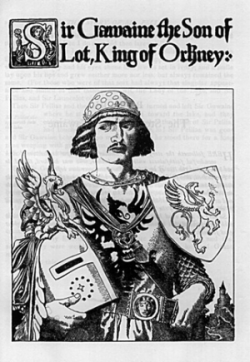

|
Usually appears as the noble, courteous nephew of Arthur, a faithful warrior adept at love, though occasionally shown as a lustful boor. He is the hero of Sir Gawain and the Green Knight, the only knight of the Round Table to accept the Green Knight's challenge, and in Percival, his courtesy leads Percival back to Arthur and his knights after Sir Kay's use of force fails. Gawain is the son of King Lot of Lothian and Orkney and of Morgause, Arthur's sister or half-sister (who is occasionally identified with Morgana). In Malory, Gawain is described as the brother of Mordred and Agravain, as well as of Gaheris and Gareth. These latter two are slain when Lancelot rescues Guinevere from the stake, unwittingly by Lancelot, for which reason Gawain vows vengeance on Lancelot, thus beginning the final downfall of the Round Table. Gawain is sometimes described as the best of Arthur's knights, though in other stories he is counted second only to Lancelot. When Gawain is mortally wounded, he writes Lancelot a letter asking for his forgiveness. In his preface to Malory's Morte DArthur, William Caxton describes Gawain's skull, which still may be seen in Dover castle. Gawain has also appeared in several films, as the rabbit-fighter in Monty Python and the Holy Grail; as an uncouth lout in John Boorman's Excalibur (played by Liam Neeson); and in two awful adaptations of Sir Gawain and the Green Knight made in 1973 and 1984 by Stephen Weeks.
|
 |